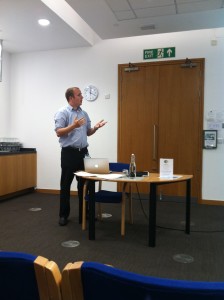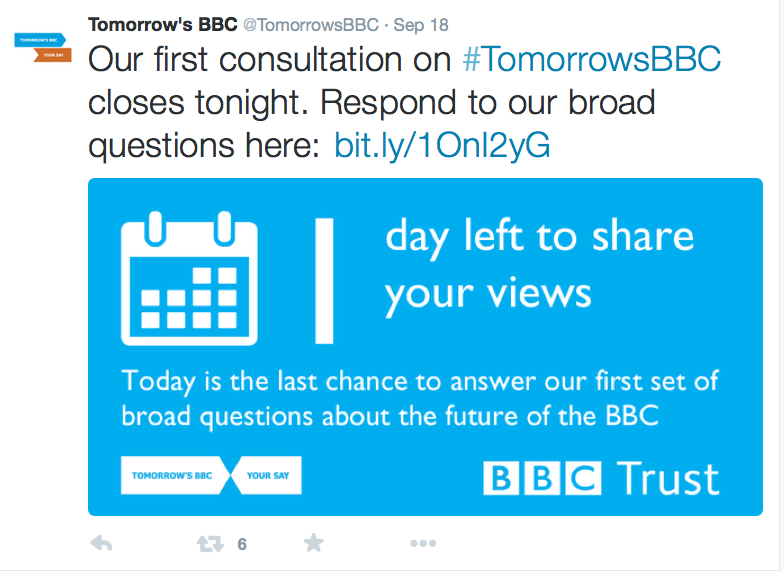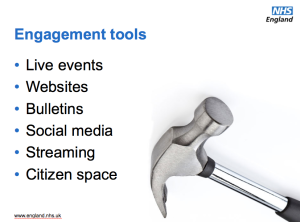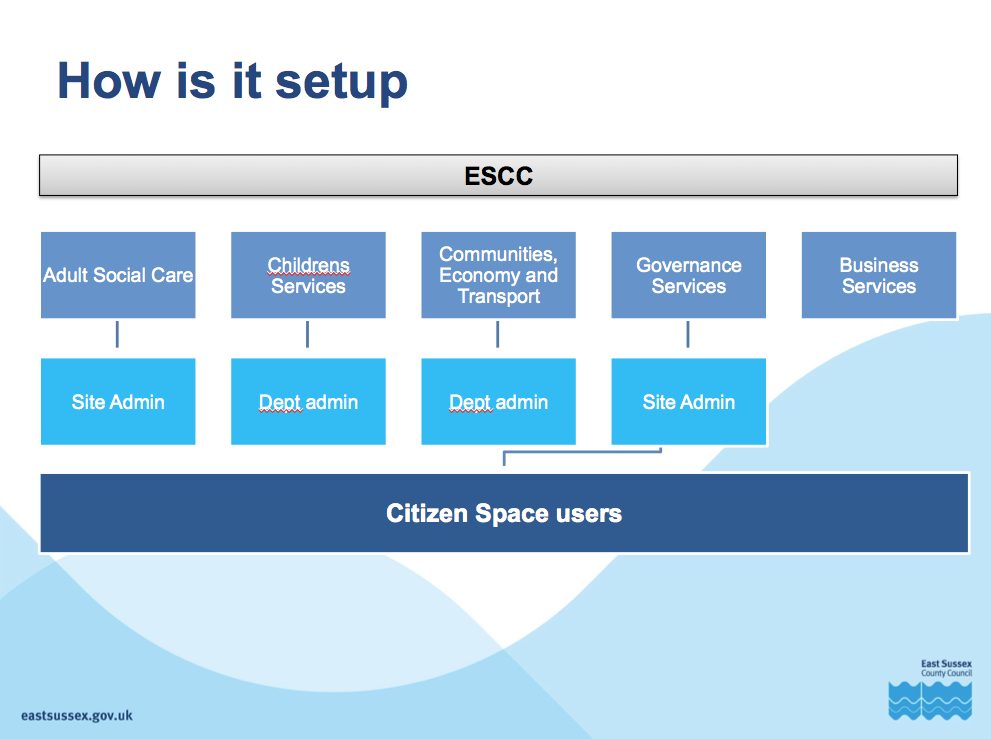On Tuesday, we had our latest UK Citizen Space user group meeting (very kindly hosted in Westminster by one of our customers and on-the-day-presenters, the Department for Business, Innovation and Skills [BIS] in the UK). The user groups are a regular opportunity for Citizen Space customers to catch up, to see how others are using the platform to manage their online consultation activity, and hopefully to pick up some interesting tips and insights.
Customers who come along invariably tell us how useful they find these days. And we at Delib also find it incredibly valuable – and inspiring, frankly – to see the different ways in which people are running excellent, important consultations using our software. So, for the benefit of those who weren’t at the event, we’ll do a quick round-up of 10 things we wish you could’ve been there to hear. First up:
1. Adopt, trial and then improve often
Since adopting Citizen Space in early 2014, BIS have been making huge inroads into the way they run digital consultations. They originally chose Citizen Space in order to move away from simply adding .pdf documents online; initially adopted the tool with a ‘trial’ approach in mind.
“We had heard of Citizen Space and wanted to try it for ourselves to see how we would get on with it”
Gwenny Whelan, Deputy Head of Digital Communications, BIS
Moving on from their initial ‘trial’ period, BIS mandated a ‘digital by default’ agenda on all online consultations in May 2015, and are now planning a full ‘roll-out’ phase of Citizen Space. The mandate has resulted in a huge increase in the number of online consultations being run through their Citizen Space instance. BIS are now reviewing and improving on their initial roll-out phase to see how they want to establish publishing standards and controls on consultations.
2. Ensure you have a strong ‘sharing plan’ in place for consultations
Both Gwenny Whelan from BIS and Al Smith from the BBC Trust spoke about the importance of having an effective sharing plan in place for promoting consultations. Al Smith from the BBC Trust treated their recent consultation on ‘Tomorrow’s BBC’ like a communications campaign for example, which help yield a huge increase in response numbers to their consultation. 10 years ago the BBC Trust got 4,000 responses, this year they received 40,000.
Through having this plan in place, the BBC Trust were also able to plan ahead and accept 300 responses via comments on mumsnet and 800 responses via Twitter.
3. Call on skills available across your organisation
One of the most challenging aspects of online consultation is that it involves a huge range of skills (ranging from analysis through to promotional skills) in order to consult effectively. In order to help address this; BIS have recently started trialling the idea of bringing in a member of the analysis team at the beginning of the process before calling on the skills of digital communication at the end to help advise on sharing the consultation.
The Scottish Government have also identified this challenge and have begun building a digital consultation team over the last year in order to address a skills gap in their organisation. The consultation team are also working with policy officers to improve the language used and number of consultations created.
4. Citizen Space can be flexible
For many organisations Citizen Space is part of a larger ‘toolbox’ of digital tools at their disposal. Beth Johnson from NHS England spoke about the broad range of tools NHS England use and how Citizen Space has been useful in ways they perhaps hadn’t originally thought of. NHS England have even used their instance as a webinar sign-up form for example.
BIS have also been able to run non-formal consultations on Citizen Space including an engagement exercise on shared parental leave and a call for evidence on the sharing economy.
5. There are pros and cons to both a centralised and de-centralised approach
Back in 2014 I blogged about the difference between a centralised and de-centralised approach to adopting Citizen Space. Generally, we’re seeing a trend towards organisations adopting a centralised approach initially before de-centralising Citizen Space. East Sussex CC have chosen to adopt a de-centralised approach which has in-part been successful as a result of a solid setup plan. An interesting learning from David Humphries at East Sussex was that response rates to their consultations have actually been increasing; a change he believes is due to giving policy officers freedom to promote their surveys directly.
6. Don’t be afraid to consult respondents on the consultation process itself
In order to start measuring how effective their consultation process is, the Scottish Government have recently started adding a question asking “how did you like this consultation?” which has already received a couple of hundred responses. By adding this simple question, the Scottish Government are also able to gain an overview of the consultation method and process itself.
7. Promoting a digital by default agenda needs to go hand in hand with becoming digitally native
Like many of the attendees, we’re really interested in how we can help plug the digital skills gap in government. Both BIS and the Scottish Government run digital fortnight sessions once a year in order to help address this which helps highlight the importance of the skills set needed. BIS have also recently made it compulsory for communications staff to have a digital module in their personal development plan (and they strongly encourage other staff to include one as well). But what can be done on a daily basis? Christian Storstein from the Scottish Government identified the importance of civil servants becoming digitally native in their everyday lives in order to reduce the fear of using tools such as Twitter in their day jobs.
Beth Johnson from NHS England commented on how intuitive Citizen Space was to use for new users which is great. She did however also identify that it’s still helpful to sit down new users to give them an overview of how the tool works:
8. Create a data journey at the beginning of the consultation
Both speakers from HS2 and the BBC Trust have recently run high profile consultations which have required the production of a rigorous data journey: a plan which details exactly how the organisation is going to deal with different type of responses.
“If you put these systems in place make sure that you stick to them” Matthew Hedges, HS2
The adoption of tight analysis processes at HS2 has also enabled them to get a feel for analysis trigger points: the point at which they are either going to analyse the responses internally or look at outsourcing the analysis work. As a rough rule of thumb, HS2 will analyse consultations which have up to 1k responses internally and anything over this gets pushed externally.
9. Insight is awesome
Through having a range of digital tools a this finger tips including Citizen Space, Twitter and Google Analytics Al Smith from the BBC Trust was able to begin tracking response rates relative to promotion which was happening around the consultation.
10. Our customers are also teaching us about Citizen Space
We regularly check our aggregator site and love it when we find that one of our customers is using Citizen Space in a way that we hadn’t realised was even possible.
In order to broaden their audience for certain consultations, the Scottish Government have added a both a video and a Soundcloud embed onto the homepage of their National Care Standards Review consultation.
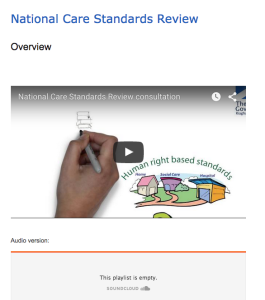
In order to promote their consultation on Tomorrow’s BBC, Al Smith from the BBC Trust came up with an ingenious idea of adding sharing widgets at the end of their consultation. This resulted in an extra 1, 250 clicks through to the online consultation. If you’re interested in learning how to add this widget the handy article which Al chose to use is available here.
 We hope you enjoyed the user group as much as us and if you didn’t have time to attend don’t fret we’ll most certainly be holding another user group in 2016.
We hope you enjoyed the user group as much as us and if you didn’t have time to attend don’t fret we’ll most certainly be holding another user group in 2016.
